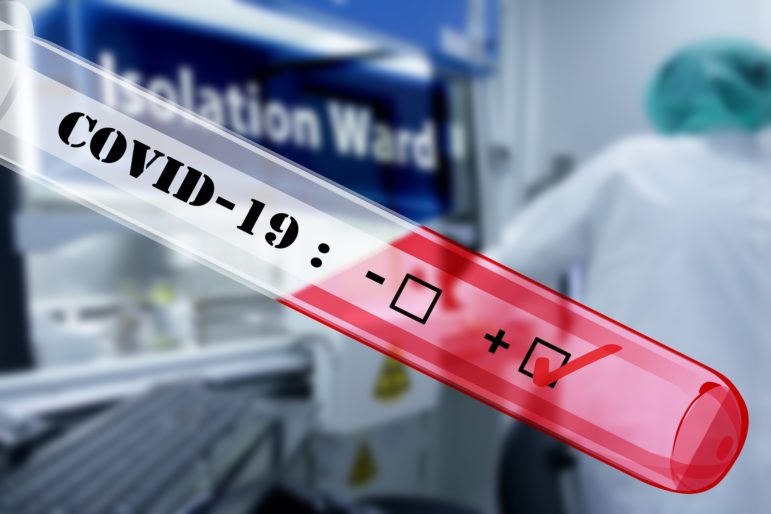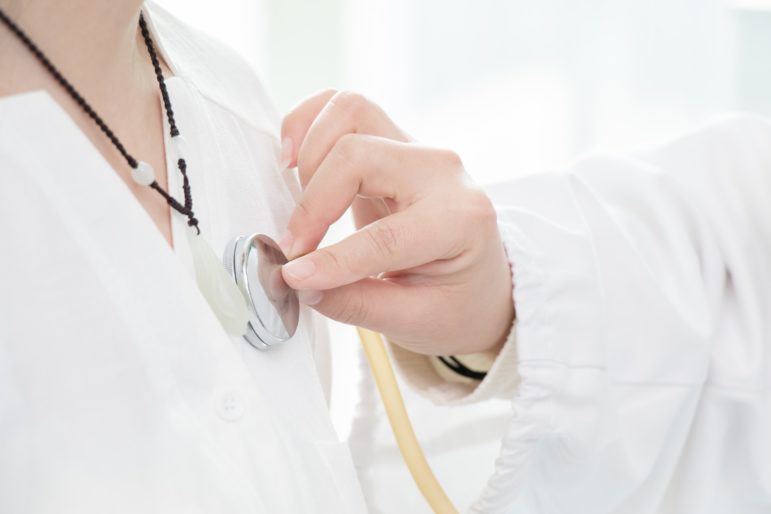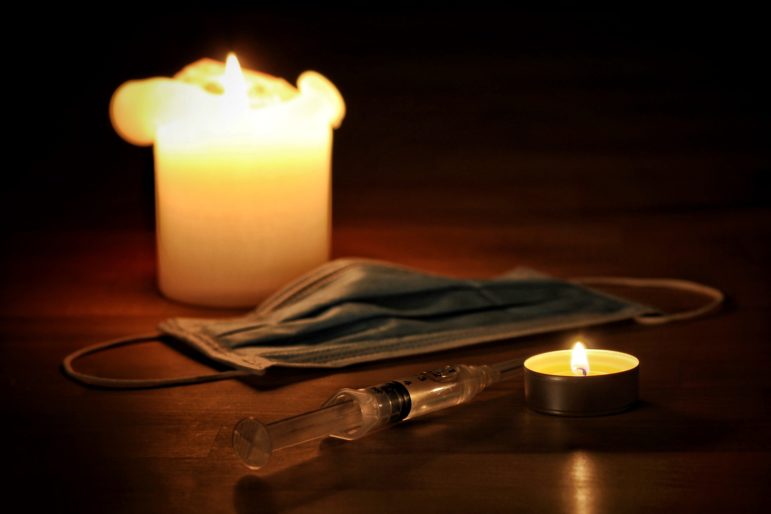MIAMI – “I wish people knew how truly dire the situation is. The lack of beds and staff to care for patients is NOT conjecture; we have hospitals in our area unable to perform non-covid-related surgical procedures or accept transfers of patients for specialty care due to lack of bed availability. We have a responsibility to be able to care for our community, and right now that is very tenuous,” says Incendia, a Strega and cardiac nurse describing her hospital’s conditions in South Florida.
Across the country, cities and states are attempting to get back to the “new normal” following outreach efforts to vaccinate their populations. As of today, the Centers for Disease Control (CDC) reports that 52.6% of Americans are fully vaccinated, and 61.9% of Americans have received at least one shot. With just a little over half of the population vaccinated, there is still hesitancy and outright rejection of receiving the SARS-CoV-2, or COVID-19 vaccine.
Anti-mask and anti-vaccination demonstrations that have increasingly involved threats and violence continue to occur across the U.S. and around the world. In the meantime, hospitals across the United States are once more feeling the effects of an unvaccinated populace as the number of hospitalizations has more than doubled over the month of August.
TWH spoke with hospital workers in hot spots across the country to find out what is happening in their units, counties, and states.
A new type of patient
Overall, there has been a shift in the type of patients hospitals and doctors’ offices are seeing with positive COVID-19 tests. The speed of transmission and onset of symptoms with the delta variant is also significantly different than the first wave of illness experienced in 2020.
Penelope who identifies fitting into Paganism more than anything else is a nurse in South Florida. She says, “Adult patients coming in now are much younger, in the 30-50 age group. They are sicker and tend to go downhill very much more rapidly.”
Amanda, a Pagan who works in a primary care office in Tampa agrees, “With Delta, people seem to be catching it quicker and getting dangerously sick very quickly.”
But it’s not just younger adults who are coming in with COVID-19 complications.
“We are seeing about 3 to 5 times as many children (infant to 18 years) having to be admitted because of covid. Many required ICU, many have problems with their heart muscles because of the inflammation from the virus,” Penelope reports.
Pantera, and nurse and Strega, agrees that her hospital has also seen a significant uptick in the number of pediatric patients they are treating for covid. “Kids,” was her simple response when asked about the difference in patients she’s seeing at her FL hospital.
“Last year, all our kids were exposure cases. Meaning, they were exposed to covid but they were not exhibiting any covid symptoms. They came in due to non-covid symptoms and it was only on our now-routine covid test that we found out they were covid positive.” She continued, “This year, with Delta, we’re receiving triple the number of pediatric cases, and they’re all covid-positive patients with definite covid symptoms. Their bodies are taking it harder than they did last year, too. This year, we’ve already sent two of our kids for heart transplants. And our adult patients are coming in sicker, getting sicker faster, and dying quicker.”
A recent report by the Association of American Pediatrics agrees with these observations. According to their most recent report, “Since the pandemic began, children represented 14.6% of total cumulated cases. For the week ending August 19, children were 22.4% of reported weekly COVID-19 cases.”
In addition, pregnant women are another demographic who are being impacted by COVID-19.
“Pregnancy lowers the immune response, so [pregnant women] are more susceptible to the virus,” says Penelope. “Our ICUs have several pregnant mothers in various stages of critical illness. Once they are at a certain point, if we do not do emergency c-sections both mother and baby will die.”
Penelope explained that this is a severe consequence of covid hospitals are seeing and has led to second and third-trimester miscarriages, as well as babies born prematurely who require critical care.
Catherine identifies as Pagan and works in obstetrics and gynecology in Pennsylvania. She reports an uptick in patients denying certain treatments and tests that are common during pregnancy, such as STD screening, the Tdap vaccine (diphtheria, pertussis, and tetanus vaccine), and others that are important to ensure the health of the unborn baby.
“This is a result of the huge amount of misinformation about covid and the vaccine,” she says, “and it is highlighting the fact that many people are becoming more and more anti-science, or suspicious of treatments and vaccines that have decades of proven safety.”
Unfortunately, COVID-19 is not the only illness that can strike. When your body is attacked by SARS-CoV2, secondary opportunistic illnesses, like pneumonia, can settle in.
Amanda has this advice, “If you end up getting a secondary illness, your doctor’s office can help keep you healthy with teledoc, or something similar to help see you in a safe setting.”
She emphasizes that you should not be afraid to reach out to your own physician for assistance. “It is safe to come in for health concerns and, more importantly, to know that your doctors and nurses are concerned for your well-being.”
Changing attitudes
Marian is a Witch who works at a South Florida hospital. She is one of many health care workers expressing frustration at the more lax attitude people seem to have regarding COVID-19.

Image credit: Gerd Altmann from Pixabay
She told TWH that patients and their families “act like there isn’t any more danger because the vaccine is available. This is especially troubling since I work with immunocompromised patients.”
Amanda agrees, “During the first phase, people were more careful in general, and seemed to understand the symptoms.” She continued, “With Delta, even though people are catching it quicker, they’re not wearing masks as quickly and seem to be unafraid of traveling.”
When asked how to combat these changing attitudes, Catherine had this to say, “Start small, reach out to family members or friends who are more reasonable and willing to listen to the facts about covid and the vaccine. The smallest spark can spread like wildfire, the trick is getting the information into the hands of those who can take it the farthest.”
Pantera concurs, “The best thing anyone can do for us now is get the word out to encourage people to get vaccinated, wear masks, and protect each other.”
Hospitals respond to the surge
Hospitals around the country are reporting worker shortages in keeping up with the latest surge of COVID-19 patients.
In places like Florida, Governor DeSantis is considering allowing out-of-state nurses to work in Florida hospitals to make up for the shortages.
Incendia describes several of the factors that are contributing to these shortages, “You have healthcare workers being driven out of the industry due to burnout, physical and emotional stress of the situation. Many of my colleagues are out of work due to illness. Yes, even staff members who are fully vaccinated are contracting covid, albeit milder cases, and having to stay home, exacerbating the staffing shortages.”
“Morale ebbs and flows depending on severity of cases and staffing,” adds Penelope. “There are never enough nurses or respiratory therapists for the number and severity of patients. Mostly, people are worn out, frustrated, and soul weary. We have been fighting this monster for a year and a half. We have also been fighting so much misinformation… A year ago, we were heroes, a designation most of us were never comfortable being called. Now, we are liars and charlatans who know nothing.”
Catherine echoed the same sentiment: “At the beginning of the pandemic, we were all ‘heroes.’ Now, we are considered to be part of some ‘deep state’ conspiracy network that is microchipping people and not to be trusted.”
Many hospitals are offering monetary incentives for picking up extra shifts, especially on nights and weekends. But with so many staff members already working extra days, days off and downtime are much needed. Some hospitals have started having their on-site clergy make rounds daily and check in with staff, as well as offering courses on mindfulness practices, motivation, and positivity. Others offer breaks during the day for employee de-stressing activities, such as free food trucks and games.
Unfortunately, the staffing shortages persist.
“We are hemorrhaging staff like every hospital in America,” says Penelope. “We onboard new nurses every 3 weeks, 10-12 at a time, and it is still not enough.”
How do healers heal?
Healthcare workers are under extreme stress and pressure.
“Here is the thing, which I think your readers will completely understand,” Penelope confides, “The great majority of us who go into the healing/caring professions tend to be empaths. That is how we connect with those in our care and to intuit their needs even when they cannot tell us. I cannot tell you how many times in my career I have just ‘known’ something about a patient, and it was proven correct. That gift is now a curse for so many because we are not only dealing with more morbidity and mortality than we have ever seen in our careers, but we are also having to be the emotional support for families who cannot be there with their loved ones. We must put on a brave face to comfort someone who is dying who will NOT get to feel the touch of a loved one before they go. We must be the support for each other, taking turns and hoping that we aren’t all crashing on the same day. We must try to discard that yoke before we get home to our families, so they are not affected by our despair.”
So how do healthcare workers discard that yoke?
Having a core support group helps many healthcare workers leave behind some of the stress of the day. Whether these are partners who can absorb some of their negative stress energy and turn it into laughter or a group of confidants who trade memes and otherwise swap funny anecdotes does help. Amanda has a group of friends who are all Pagan whom she speaks with daily. They check in on each other, make sure they’re all okay, and build each other up. They will make the time to connect in person safely for better connections when they need it.
For most of the healthcare workers we spoke to, the main outlet is taking the sacred time they need for themselves to recharge and be able to face the next day.
“I devote some of my sacred time to meditation, reflection, connecting with nature, and some physical activity,” shares Incendia. “When I can, I combine physical movement with connection to nature; this is deeply healing and soothing to my Spirit.”
Penelope agrees, “I feel the most spiritual and receive the most healing when I can be outside. Whether that is kayaking, walking trails, swimming in the ocean, or just exploring the grass with bare feet, that is my altar.”
What can you do?
With the influx of COVID-positive patients in hospitals across the country, many people are dying from things they should not be dying from. Hospitals are running out of everything — staff energy, supplies, oxygen, and rooms.
Just this week, CNN reported on Daniel Wilkinson, a US Army veteran and Purple Heart recipient who died due to gallstones after being unable to find an ICU bed in 5 different states.
Catherine says her husband recently had issues related to cancer treatment and had to wait 5 hours for a bed at their hospital while he was actively bleeding. This was due to a lack of beds caused by the increase in critical COVID-19 patients. One of our TWH readers, who wished to remain anonymous, recently lost her husband due to lack of beds at their local hospital.
When asked what they would say to someone who is currently not taking all precautions that the CDC guidelines recommend, our healthcare workers were nearly unanimous in their responses.
“Listen to your MD’s and reputable sources. The vaccine is safe,” says Marian, “and wearing a mask may be an inconvenience and occasionally uncomfortable, but do it anyway.”
Amanda reminds us to reach out to our doctors if we are feeling sick, “Let your doctor know. Doctors’ offices can and will reach out to check on you.”
“Get vaccinated. Take precautions. The best thing anyone can do to support healthcare workers is not make our jobs more difficult,” says Incendia.
Penelope agrees, “The most helpful things that anyone in the community can do is get vaccinated if they are eligible, wear masks when in gatherings, and maintain social distancing.”
She also encourages everyone to advocate for following the recommendations from the CDC, and fight misinformation by offering responses that are factual and nonconfrontational.
While most of the medical staff TWH spoke with support everyone receiving the vaccine, some working in the medical industry expressed dissatisfaction and a sense of betrayal over the decision.
Kim, a nurse in Pennsylvania who identifies as Pagan, does not agree that vaccine mandates are the answer, “Everyone has a right to decide what to do with and how to treat their own body.”
With regards to the guidelines put out by the CDC and other groups during the initial months of the pandemic, she said, “The sources that we are supposed to be able to trust have changed their stance multiple times contradicting themselves. Science is an art as well as practice and changes over time. I feel that guidelines have been politically motivated and not completely based on science, which causes doubt.”
TWH Note: Because SARS-CoV-19 is a novel disease, scientists and public health authorities have been learning in real time, and knowledge about COVID-19 and its variants was, and still is evolving. Accurate and up-to-date infromation about COVID-19 is availble via the Center for Disease Control. Information regarding the Food and Drug Aadmininsitration’s approval of the Pfizer vaccine is available via the FDA.
When asked about hospitals that are imposing vaccine mandates on employees to continue working there, she added, “Medical providers that took care of covid positive patients a year ago are being threatened with job loss if they do not get vaccinated. We [healthcare workers] are still dispensable and the most important thing is the bottom line on a piece of paper on an accountant’s desk. It seems as though Big Business has either forgotten about or simply does not care about the human element, causing a pandemic of distrust that pervades into the homes and souls of everyone and everything.”
Empathy works both ways
When asked what our community of readers could do to offer support, the most common answers were “Listen to us” and “Pray for us.”
Amanda suggests, “Listen when people are talking who work in these fields. If you have friends or loved ones on the front lines, check in on them and make sure they are okay. Invite them out for a drink or a moving, or offer to simply hang out and talk.”
Marian agrees with this, but also reminds us, “Don’t take it personally if your friends are too tired to go out and do anything. Maybe change the going out to you coming over for a movie and take out. Be aware that sensitive to everyone’s needs.”
Make sure to check in on those who you know who are in the front lines at their local hospitals.
“My friends sent me a care package this week. It was a little box, filled with small things, but it showed me they were thinking about me,” Pantera shares, “and it make me feel seen. Like someone knows it’s bad for us and was trying to lighten my day.” She also makes a point to say a prayer for other hospital workers when they get off the elevator on the covid floor. “I always wish them a good shift, and say a small prayer for them that they can get through the day.”
Penelope asks simply for prayers. “Offer prayers for us. We will make it through this, but there are going to be quite a few who may be broken at the end. Pray that they can maintain their resilience.”
The Wild Hunt is not responsible for links to external content.
To join a conversation on this post:
Visit our The Wild Hunt subreddit! Point your favorite browser to https://www.reddit.com/r/The_Wild_Hunt_News/, then click “JOIN”. Make sure to click the bell, too, to be notified of new articles posted to our subreddit.


Pingback: Nurses speak out as they continue to feel the strain from surging hospitalizations and the rise in the number of children being infected and admitted. #covid19 #healthcare #nurses #pagan #witches #wicca #covidvaccine (@thewildhunt) - The COVID Site